
Long ago (more than 25 years), I got a call from a stranger, an on-duty cop. He said his name, where he was calling from (a locale not a quick drive), and who had recommended he call me (a DUSM I knew; I found out later he was standing nearby). The caller then said this: “I just shot someone in the line of duty. . . . . . . . . .” I was able to conduct about a 30-minute “interview” (today I would call this a “debrief”) of the client (attorney-client relationship can be established without formal engagement agreement or fee payment; the cop understood he was speaking with a licensed attorney in confidence for the purpose of obtaining legal advice). He was not within earshot of anybody on the scene; however, I assumed others could see him.
I “found” my notes from that conversation. With some minor rewording and formatting punctuation, here are the questions I put to the client (answers and some of the follow up inspired by his answers have been omitted to protect the innocent):
- Were you injured? Do you want medical care; has it been offered/suggested?
- Have you called it in and/or requested other police response; what did you say?
- Are you hearing me well?
- Has the scene been secured by supervisory law enforcement? Who is investigating; who is in charge? Has any evidence been disturbed?
- Is the press there/expected?
- Give me the particulars of your closest and most trusted relative and/or friend.
- Give me your particulars, complete name and any nickname, rank, ID #, supervisor’s name; your address, telephone number, age, height/weight, race, health.
- Are you RH or LH? Do you have any medical conditions, duty-related or otherwise. What is your vision: were you wearing corrective lenses?
- When did you last sleep, eat; did you ingest any drugs, Rx or other, or alcohol in the last 36 hours?
- When did your shift start, when does it end? How long have you been a cop?
- Give me the particulars of the firearm used. Tell me everything else that is on your duty belt and in your pockets. Anything carried out of policy?
- Were you doing something proactive, or was this a dispatched call? What happened?
- Do you think the shooting was within policy; state law? Has anybody said anything or voiced an opinion to the contrary? By your agency procedure, what must you do and what are you allowed to do now?
- Did you issue a warning or challenge or employ non-deadly force before shooting?
- Tell me the specifics about the shooting; agency gun and ammunition; gun modifications, by whom; how many times did you fire; have you physically counted; did you re-engage, any shots miss, you reload?
- Where is your gun; what’s its condition? Who has touched it? When did you last qualify with it?
- What is the status of the person shot? Did you render aid?
- Why did you shoot? Was the person armed? Did he say anything to you?
- Were you ever in another OIS where you shot, or another LEO did and you were present?
- Were there eyewitnesses; who are they?
- Are you free to leave? Are you going to be escorted somewhere? Can you meet an attorney at an agreed location before submitting to additional questioning? Can your agency interview be postponed?
- What are you wearing; will you be asked to give up your clothes as evidence? Are you going to give a blood and/or urine sample?
Some of the above are yes or no; some suggest or require a narrative answer. Was the client able to answer all of my questions? No. (An initial debrief one or two days later might have been more productive). Is the above a complete debrief template? Probably not. Is the reason for each question rather obvious? Probably should be. (There is likely more to some than you think).
Lessons Learned: The aftermath of any shooting is complicated. Very complicated. Say little or nothing (and only what you need to say) and wait for counsel, whether you are an LEO or nonsworn. Get to the important stuff with the attorney quickly, from a place you cannot be overheard. Don’t text or go on social media. Sequestration, detention, or arrest may come sooner than expected. In any event, prepare for an aftermath (you and family) much different than what it was like 25+ years ago.
Disclaimer: No MSW post constitutes particularized legal advice, or creates an attorney-client relationship with a reader.


